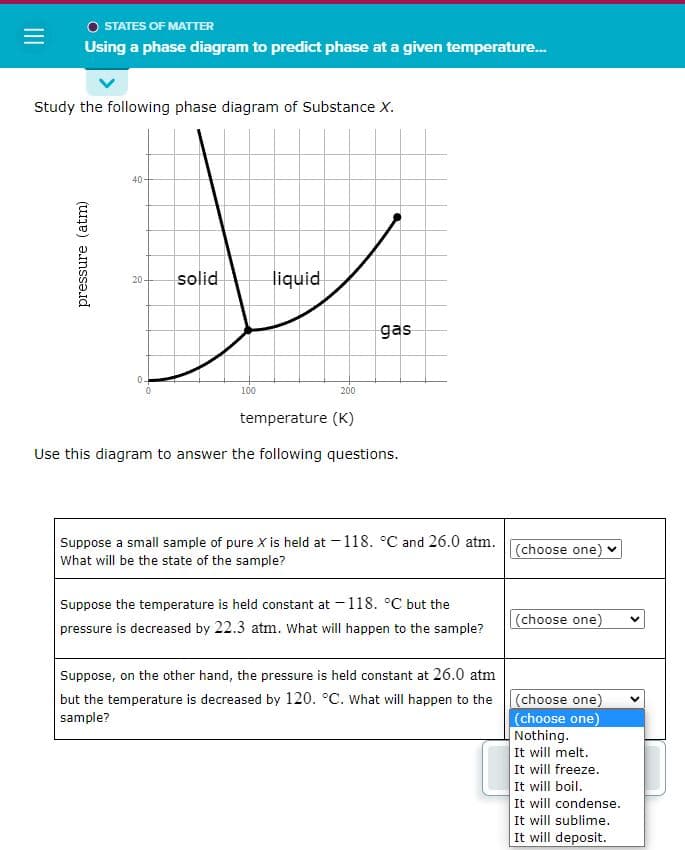Study the following phase diagram of Substance X. pressure (atm) 40 20- 0. solid 100 liquid 200 gas temperature (K) Use this diagram to answer the following questions. Suppose a small sample of pure X is held at -118. °C and 26.0 atm. What will be the state of the sample? Suppose the temperature is held constant at -118. °C but the pressure is decreased by 22.3 atm. What will happen to the sample? Suppose, on the other hand, the pressure is held constant at 26.0 atm but the temperature is decreased by 120. °C. What will happen to the sample? (choose one) ✓ (choose one) (choose one) (choose one) Nothing. It will melt. It will freeze. It will boil. It will condense. It will sublime. It will deposit
Study the following phase diagram of Substance X. pressure (atm) 40 20- 0. solid 100 liquid 200 gas temperature (K) Use this diagram to answer the following questions. Suppose a small sample of pure X is held at -118. °C and 26.0 atm. What will be the state of the sample? Suppose the temperature is held constant at -118. °C but the pressure is decreased by 22.3 atm. What will happen to the sample? Suppose, on the other hand, the pressure is held constant at 26.0 atm but the temperature is decreased by 120. °C. What will happen to the sample? (choose one) ✓ (choose one) (choose one) (choose one) Nothing. It will melt. It will freeze. It will boil. It will condense. It will sublime. It will deposit
Chemistry: Principles and Practice
3rd Edition
ISBN:9780534420123
Author:Daniel L. Reger, Scott R. Goode, David W. Ball, Edward Mercer
Publisher:Daniel L. Reger, Scott R. Goode, David W. Ball, Edward Mercer
Chapter11: Liquids And Solids
Section: Chapter Questions
Problem 11.46QE
Related questions
Question

Transcribed Image Text:O STATES OF MATTER
Using a phase diagram to predict phase at a given temperature...
Study the following phase diagram of Substance X.
pressure (atm)
40
20-
0-
solid
100
liquid
200
gas
temperature (K)
Use this diagram to answer the following questions.
Suppose a small sample of pure X is held at -118. °C and 26.0 atm.
What will be the state of the sample?
Suppose the temperature is held constant at -118. °C but the
pressure is decreased by 22.3 atm. What will happen to the sample?
Suppose, on the other hand, the pressure is held constant at 26.0 atm
but the temperature is decreased by 120. °C. What will happen to the
sample?
(choose one) ✓
(choose one)
(choose one)
(choose one)
Nothing.
It will melt.
It will freeze.
It will boil.
It will condense.
It will sublime.
It will deposit.
Expert Solution
This question has been solved!
Explore an expertly crafted, step-by-step solution for a thorough understanding of key concepts.
This is a popular solution!
Trending now
This is a popular solution!
Step by step
Solved in 4 steps with 3 images

Knowledge Booster
Learn more about
Need a deep-dive on the concept behind this application? Look no further. Learn more about this topic, chemistry and related others by exploring similar questions and additional content below.Recommended textbooks for you

Chemistry: Principles and Practice
Chemistry
ISBN:
9780534420123
Author:
Daniel L. Reger, Scott R. Goode, David W. Ball, Edward Mercer
Publisher:
Cengage Learning

Chemistry: The Molecular Science
Chemistry
ISBN:
9781285199047
Author:
John W. Moore, Conrad L. Stanitski
Publisher:
Cengage Learning

Chemistry: Principles and Reactions
Chemistry
ISBN:
9781305079373
Author:
William L. Masterton, Cecile N. Hurley
Publisher:
Cengage Learning

Chemistry: Principles and Practice
Chemistry
ISBN:
9780534420123
Author:
Daniel L. Reger, Scott R. Goode, David W. Ball, Edward Mercer
Publisher:
Cengage Learning

Chemistry: The Molecular Science
Chemistry
ISBN:
9781285199047
Author:
John W. Moore, Conrad L. Stanitski
Publisher:
Cengage Learning

Chemistry: Principles and Reactions
Chemistry
ISBN:
9781305079373
Author:
William L. Masterton, Cecile N. Hurley
Publisher:
Cengage Learning

Chemistry & Chemical Reactivity
Chemistry
ISBN:
9781337399074
Author:
John C. Kotz, Paul M. Treichel, John Townsend, David Treichel
Publisher:
Cengage Learning

Chemistry & Chemical Reactivity
Chemistry
ISBN:
9781133949640
Author:
John C. Kotz, Paul M. Treichel, John Townsend, David Treichel
Publisher:
Cengage Learning

Chemistry for Engineering Students
Chemistry
ISBN:
9781337398909
Author:
Lawrence S. Brown, Tom Holme
Publisher:
Cengage Learning